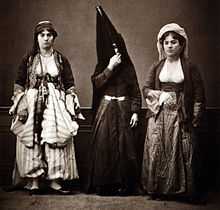Women in Lebanon
 Women of Mount Lebanon in the late 1800s. | |
| Gender Inequality Index[1] | |
|---|---|
| Value | 0.443 (2012) |
| Rank | 78th out of 148 |
| Maternal mortality (per 100,000) | 25 (2010) |
| Women in parliament | 3.1% (2012) |
| Females over 25 with secondary education | 53.0% (2010) |
| Women in labour force | 22.6% (2011) |
| Global Gender Gap Index[2] | |
| Value | 0.6028 (2013) |
| Rank | 123rd out of 136 |
| Women in society |
|---|
 |
|
|
|
Popular culture |
|
Due to the large number of officially recognized religions in Lebanon, Lebanese family matters are governed by at least 15 [3] personal statute codes. Lebanese women have legal protection that varies depending on their religion.[4] Marriageable age can be as young as 12.5, polygamy is allowed if the male of the family is Muslim, parental authority belongs to the patriarch of the house and legal guardian of all children, and female children receive less inheritance than a male child would.[3] Children born to a Lebanese woman and a man from another country will not have their children granted Lebanese nationality.[5]
Local and regional NGOs have helped to increase awareness of violence against women in Lebanon.[6][7] Government policies regarding this are poor however, and attempts to improve this area have been met with resistance.[8] Lebanon's laws do not recognize the concept of spousal rape,[3] and attempt to add this to law have been attacked by Lebanese clerics.[9]
The family in Lebanon, as elsewhere in the Middle East region, assigns different roles to family members on the basis of gender. The superior status of men in society and within the narrow confines of the nuclear family transcends the barriers of sect or ethnicity. Lebanese family structure is patriarchal. The centrality of the father figure stems from the role of the family as an economic unit, in which the father is the property owner and producer on whom the rest of the family depend. This notion prevails even in rural regions of Lebanon where women participate in peasant work. The roles of women have traditionally been restricted to those of mother and home-maker. However, since the 1970s Arab societies have allowed women to play a more active role socially and in the work force, basically as a result of the manpower shortage caused by heavy migration of men to Persian Gulf countries. In Lebanon the percentage of women in the labor force has increased.
Notwithstanding the persistence of traditional attitudes regarding the role of women, Lebanese women enjoy equal civil rights and attend institutions of higher education in large numbers (for example, women constituted 41 percent of the student body at the American University of Beirut in 1983). Although women in Lebanon have their own organizations, most exist as subordinate branches of the political parties.
See also
References
![]() This article incorporates public domain material from websites or documents of the Library of Congress Country Studies.
This article incorporates public domain material from websites or documents of the Library of Congress Country Studies.
- ↑ "Human Development Report". United Nations Development Programme. 2013. p. 156.
- ↑ "The Global Gender Gap Report 2013". World Economic Forum. pp. 12–13.
- ↑ 3.0 3.1 3.2 Gender Equality in Lebanon | Social Institutions and Gender Index (SIGI)
- ↑ http://www.jstor.org/discover/10.2307/3012648?uid=3738032&uid=2129&uid=2&uid=70&uid=4&sid=56016570863
- ↑ The Daily Star | News | Politics | Hariri vows support for women's rights
- ↑ Women's Rights Monitor
- ↑ The Daily Star | News | Local News | Over 30 NGOs demonstrate for women's rights
- ↑ IRIN Middle East | LEBANON: Tussle over gender violence law | Lebanon | Early Warning | Gender Issues | Governance | Human Rights | Security
- ↑ Lebanon's clerics attack domestic violence law - Arab News
External links
| Wikimedia Commons has media related to Women of Lebanon. |
| |||||||||||||||||||||||||||||||||